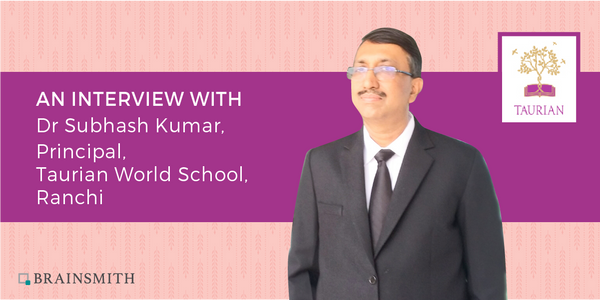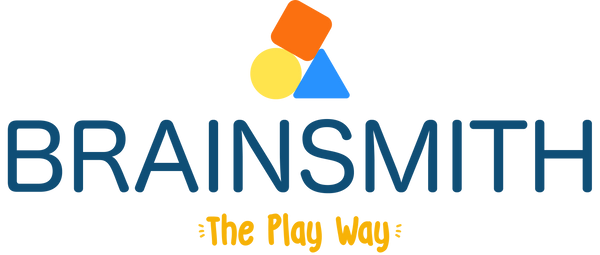An Interview with The Principal, Taurian World School
Posted on February 10 2017


Q1. What are your thoughts on Early Childhood Development & Learning?
Childhood, as we know, is a stage when children undergo different phases of growth. It is also a stage when both nature and nurturing constantly intertwine to determine the course of a child’s development. Though this development can vary for different children depending on various factors such as environment and cultural differences. Irrespective of these differences, Early Childhood Development & Learning is equally indispensable for all children.
UNESCO defines Early childhood as ‘...the period from birth to eight years old. A time of remarkable brain growth, these years lay the basis for subsequent development’ and thus lays a lot of emphasis on Early Childhood Care and Education (ECCE).
I believe, Early Childhood Learning & Development is every child’s right and we as educationists, parents and caregivers must never deprive them of this right even in the least. Instead, we must choose to make the most of these precious early years and help shape the future of the world in the best possible way.
Q2. Are you using early learning aids/ tools in your school? If yes, then what all tools have you used thus far?
Since at Taurian World School we deeply believe in inculcating the art of holistic learning, Early Childhood Education and Care plays an important role with us when it comes to aiding children’s early learning & development.
Some of the early learning aids /tools that we’re currently using in our teaching & learning process are Interactive Whiteboards & Websites, Montessori Learning Aids, Educational Video Sites, Digital Storytelling, and also Quantum Cards.
For the wholesome development of every child - cognitive, emotional, physical and social- we want to start early and strengthen children’s foundation for future growth, learning and well being
Q3. What has your experience as a school been like with respect to using Quantum Cards in particular?
Of the many observations that we made, one of my favourites has been the reduction of screen time. Considering the digital ease of access to information these days, Quantum Cards come as a breath of fresh air. We’ve noticed how these cards are helping in sensory stimulation,be it auditory, visual or even brain stimulation. The fact that they’re not just Flash Cards, but scientifically designed encyclopedic sources of information have garnered special favour with our teaching staff. And the hand-painted, high quality images on the front seem to have captured the early starters’ imaginations quite well. In my opinion,the larger size of the cards also seems to contribute to the children being able to relate to the images, better.
Q4. In a day and age when most information is sought after online/digital, where do such physical format flashcards stand?
I think I answered that one in my previous observation. (Laughs)
In a day and age when humans are glued to screens every where, it’s only heartening to see how little ones are showing interest in these traditional learning ways. Not only is it increasing their attention span (since kids are known to have shorter attention spans and fast moving digital images only reduce that further ),teaching methods like Quantum Cards, Flash Learning, Montessori and Waldorf ways of education are becoming increasing popular. Both teachers and students love these methods for their flexibility, fun and wonderful results.
Q5. How much of a child’s intelligence do you feel is being affected/multiplied by early learning aids?
There is increasing recognition that the first five years of a child’s life lay the groundwork that shapes children's future. Since research shows that 90% of brain development takes place in these years, it’s inevitable that we encash on these years and impart the best care, education and learning in these formative years, itself. This is where Early Learning Aids play a crucial role as they help adults hasten as well as enliven a child’s learning process. Since these tools are specifically designed to create a visual and interactive experience, it further promotes the interest of students in the topics at hand.
Q6. How does early childhood education impact the post preschool years of a child?
To quote Maria Montessori- “The most important period of life is not the age of university studies, but the first one, the period from birth to the age of six.” It’s no surprise that Early Childhood Education serves as the substratum in a child’s life and we all know that the stronger the underpinning, the sturdier the structure that’s built on it. Therefore, Early Childhood Education becomes all the more imperative in order to determine a better future for our progeny.
In our experience at the Taurian World School we’re already seeing the seeds of it germinate in the form of : increased learning abilities (improved grades); enhanced curiosity and imagination; considering learning a joy as opposed to a chore; an expanded attention span (more focus in class); greater teacher-student and peer-to-peer interactions (better socializing, co-operation, sharing among students).
These early learning environs can determine what course a child’s future takes.Whether it is resilience, respect, patience, teamwork or just the love for learning, all of it is determined in these formative years and steadily spills over as they keep growing.
Q7. What is your recommendation/advice for newborn and young parents when it comes to early childhood education and care?
In my 22 years of experience, having worked closely with both parents and children, I feel Parent involvement in early childhood is of prime importance. Parents are the first teachers kids encounter and the latter learn, imbibe and ape most of the former’s behaviour. Although both roles are new born in themselves, but the advantage with the Parents is that they can prep well in advance for the new family member’s arrival. Reading or attending classes on early childhood development can be a great way to start this process. I’d say,the more the parents are involved, the better the results that will follow. Of course schools and preschools will always be there, but a child’s first education always begins at home.
About the Author: Dr. Subhash Kumar,Principal Taurian World School, has a career in the filed of education for over 22 years. Of these, he has served 12 years as Principal of various esteemed schools. Dr. Kumar has earned a Ph.D for his research on deforestation in East India . Among other portfolios, Dr. Kumar is also a member of CBSE inspecting team for upgradation of schools in Kerala and Maharashtra. He has also headed IB and CIE schools in his previous career.
